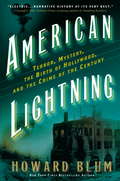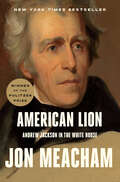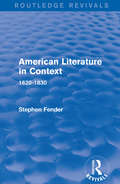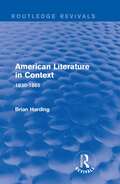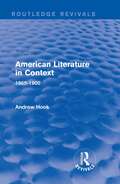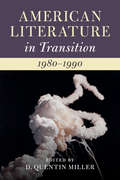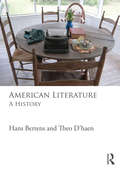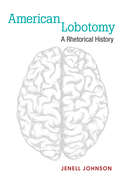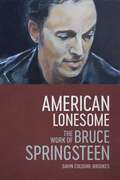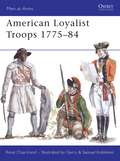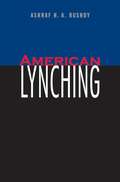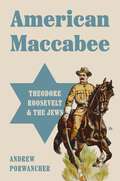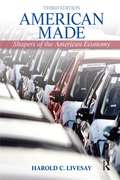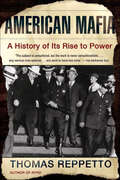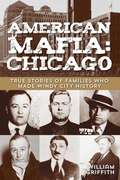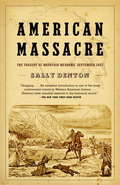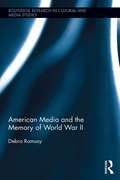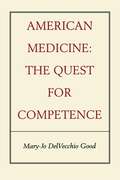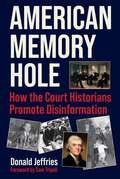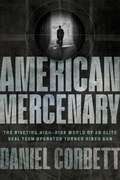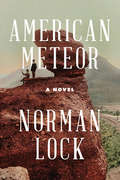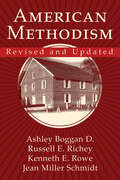- Table View
- List View
American Lightning: Terror, Mystery, and the Birth of Hollywood
by Howard BlumIt was an explosion that reverberated across the country--and into the very heart of early-twentieth-century America. On the morning of October 1, 1910, the walls of the Los Angeles Times Building buckled as a thunderous detonation sent men, machinery, and mortar rocketing into the night air. When at last the wreckage had been sifted and the hospital triage units consulted, twenty-one people were declared dead and dozens more injured. But as it turned out, this was just a prelude to the devastation that was to come. In American Lightning, acclaimed author Howard Blum masterfully evokes the incredible circumstances that led to the original "crime of the century"--and an aftermath more dramatic than even the crime itself. With smoke still wafting up from the charred ruins, the city's mayor reacts with undisguised excitement when he learns of the arrival, only that morning, of America's greatest detective, William J. Burns, a former Secret Service man who has been likened to Sherlock Holmes. Surely Burns, already world famous for cracking unsolvable crimes and for his elaborate disguises, can run the perpetrators to ground. Through the work of many months, snowbound stakeouts, and brilliant forensic sleuthing, the great investigator finally identifies the men he believes are responsible for so much destruction. Stunningly, Burns accuses the men--labor activists with an apparent grudge against the Los Angeles Times' fiercely anti-union owner--of not just one heinous deed but of being part of a terror wave involving hundreds of bombings. While preparation is laid for America's highest profile trial ever--and the forces of labor and capital wage hand-to-hand combat in the streets--two other notable figures are swept into the drama: industry-shaping Filmmaker D. W. Griffith, who perceives in these events the possibility of great art and who will go on to alchemize his observations into the landmark film The Birth of a Nation; and crusading lawyer Clarence Darrow, committed to lend his eloquence to the defendants, though he will be driven to thoughts of suicide before events have fully played out. Simultaneously offering the absorbing reading experience of a can't-put-it-down thriller and the perception-altering resonance of a story whose reverberations continue even today, American Lightning is a masterpiece of narrative nonfiction.
American Lion: Andrew Jackson in the White House
by Jon MeachamAndrew Jackson, his intimate circle of friends, and his tumultuous times are at the heart of this remarkable book about the man who rose from nothing to create the modern presidency. Beloved and hated, venerated and reviled, Andrew Jackson was an orphan who fought his way to the pinnacle of power, bending the nation to his will in the cause of democracy. Jackson's election in 1828 ushered in a new and lasting era in which the people, not distant elites, were the guiding force in American politics. Democracy made its stand in the Jackson years, and he gave voice to the hopes and the fears of a restless, changing nation facing challenging times at home and threats abroad. To tell the saga of Jackson's presidency, acclaimed author Jon Meacham goes inside the Jackson White House. Drawing on newly discovered family letters and papers, he details the human drama-the family, the women, and the inner circle of advisers-that shaped Jackson's private world through years of storm and victory. One of our most significant yet dimly recalled presidents, Jackson was a battle-hardened warrior, the founder of the Democratic Party, and the architect of the presidency as we know it. His story is one of violence, sex, courage, and tragedy. With his powerful persona, his evident bravery, and his mystical connection to the people, Jackson moved the White House from the periphery of government to the center of national action, articulating a vision of change that challenged entrenched interests to heed the popular will-or face his formidable wrath. The greatest of the presidents who have followed Jackson in the White House-from Lincoln to Theodore Roosevelt to FDR to Truman-have found inspiration in his example, and virtue in his vision. Jackson was the most contradictory of men. The architect of the removal of Indians from their native lands, he was warmly sentimental and risked everything to give more power to ordinary citizens. He was, in short, a lot like his country: alternately kind and vicious, brilliant and blind; and a man who fought a lifelong war to keep the republic safe-no matter what it took. Jon Meacham in American Lion has delivered the definitive human portrait of a pivotal president who forever changed the American presidency-and America itself.<P><P> Pulitzer Prize Winner
American Literature
by Directorate Of Distance and Continuing Education - Manonmaniam Sundaranar UniversityThe book published by the Directorate of Distance & Continuing Education, Manonmaniam Sundaranar University, Tirunelveli, explores the integral relationship between American literature and the nation's history, well-being, and cultural characteristics. Positioned as a mirror reflecting the multifaceted aspects of America, the book delves into the rich tapestry of literary works that not only chronicle the nation's historical evolution but also serve as a reservoir of the collective creative thoughts and imaginations of its people. From the early foundational texts to contemporary masterpieces, the synthesis of American literature emerges as an indispensable part of the nation's cultural identity, offering readers a profound insight into the intricacies of American society and its dynamic journey through time.
American Literature (2nd edition)
by Raymond A. St. JohnAmerican Literature for Christian Schools tells the story of the writing done in the United States from its beginnings until the present. It covers key events, major literary movements, and principal players of a dynamic heritage that was born four centuries ago and remains today a vital expression of the heart and soul of the American people. Like other anthologies it showcases as fully as possible the rich variety and impressive appeal of the literature produced in this nation. But the book does more. It tells the story of a culture that has shifted from essential agreement with the truth of God’s Word to almost universal rejection of that truth. At times the change, as reflected in the literature, has been virtually glacial in its pace, hardly discernible to those of its day. At other times the change has been dramatic, apparent even to casual observers.
American Literature in Context: 1620-1830 (Routledge Revivals: American Literature in Context)
by Stephen FenderFirst published between 1982 and 1983, this series examines the peculiarly American cultural context out of which the nation’s literature has developed. Covering the years from 1620 to 1830, this first volume of American Literature in Context examines a range of texts from the writings of the Puritan settlers through the declaration of Independence to the novels of Fenimore Cooper. In doing so, it shows how early Americans thought about their growing nation, their arguments for immigration, for political and cultural independence, and the doubts they experienced in this ambitious project. This book will be of interest to those studying American literature and American studies.
American Literature in Context: 1830-1865 (Routledge Revivals: American Literature in Context)
by Brian HardingFirst published between 1982 and 1983, this series examines the peculiarly American cultural context out of which the nation’s literature has developed. Covering the years from 1830 to 1865, this second volume of American Literature in Context examines twelve major American writers of the three decades before the Civil War, including Edgar Allan Poe, Ralph Waldo Emerson, Henry David Thoreau, Herman Melville and Walt Whitman. The book also analyses the writing of two contemporary historians, an intellectual Journalist and Abraham Lincoln. Among the major themes discussed the religious heritage of New England Transcendentalism, sectional rivalries, tensions between self-culture and social awareness, and the widening gulf between the idea of national destiny and the fact of growing disunity. In addition, the dominant literary forms of the period – sermon, essay, travelogue – are related to the common cultural assumptions of the age. This book will be of interest to those studying American literature and American studies.
American Literature in Context: 1865-1900 (Routledge Revivals: American Literature in Context)
by Andrew HookFirst published between 1982 and 1983, this series examines the peculiarly American cultural context out of which the nation’s literature has developed. Covering the years from 1865 to 1900, this third volume of American Literature in Context focuses on the struggles of American writers to make sense of their rapidly changing world. In addition to such major figures as Walt Whitman, Henry James, Emily Dickinson and Mark Twain, it analyses the writings of an unorthodox economist (Henry George), a Utopian reformer (Edward Bellamy) and a critical sociologist (Thorstein Veblen). Particular attention is paid to the challenge to conventional literary and cultural values represented by writers such as William Dean Howell who pursued a new form of scientific, democratic realism in American writing. This book will be of interest to those studying American literature and American studies.
American Literature in Transition, 1980–1990
by D. Quentin MillerHistory has not been kind to the 1980s. The decade is often associated with absurd fashion choices, neo-Conservatism in the Reagan/Bush years, the AIDS crisis, Wall Street ethics, and uninspired television, film, and music. Yet the literature of the 1980s is undeniably rich and lasting. American Literature in Transition, 1980-1990 seeks to frame some of the decade's greatest achievements such as Toni Morrison's monumental novel Beloved and to consider some of the trends that began in the 1980s and developed thereafter, including the origins of the graphic novel, prison literature, and the opening of multiculturalism vis--vis the 'canon wars'. This volume argues not only for the importance of 1980s American literature, but also for its centrality in understanding trends and trajectories in all contemporary literature against the broader background of culture. This volume serves as both an introduction and a deep consideration of the literary culture of our most maligned decade.
American Literature: A History
by Hans Bertens Theo D'haenThis comprehensive history of American Literature traces its development from the earliest colonial writings of the late 1500s through to the present day. This lively, engaging and highly accessible guide: <p><p> offers lucid discussions of all major influences and movements such as Puritanism, Transcendentalism, Realism, Naturalism, Modernism and Postmodernism <p> draws on the historical, cultural, and political contexts of key literary texts and authors <p> covers the whole range of American literature: prose, poetry, theatre and experimental literature <p> includes substantial sections on native and ethnic American literatures <p> explains and contextualises major events, terms and figures in American history. <p> This book is essential reading for anyone seeking to situate their reading of American Literature in the appropriate religious, cultural, and political contexts.
American Lobotomy: A Rhetorical History
by Jenell JohnsonAmerican Lobotomy studies a wide variety of representations of lobotomy to offer a rhetorical history of one of the most infamous procedures in the history of medicine. The development of lobotomy in 1935 was heralded as a "miracle cure" that would empty the nation's perennially blighted asylums. However, only twenty years later, lobotomists initially praised for their "therapeutic courage" were condemned for their barbarity, an image that has only soured in subsequent decades. Johnson employs previously abandoned texts like science fiction, horror film, political polemics, and conspiracy theory to show how lobotomy's entanglement with social and political narratives contributed to a powerful image of the operation that persists to this day. The book provocatively challenges the history of medicine, arguing that rhetorical history is crucial to understanding medical history. It offers a case study of how medicine accumulates meaning as it circulates in public culture and argues for the need to understand biomedicine as a culturally situated practice.
American Lonesome: The Work of Bruce Springsteen
by Gavin Cologne-BrookesAmerican Lonesome: The Work of Bruce Springsteen begins with a visit to the Jersey Shore and ends with a meditation on the international legacy of Springsteen’s writing, music, and performances. Gavin Cologne-Brookes’s innovative study of this popular musician and his position in American culture blends scholarship with personal reflection, providing both an academic examination of Springsteen’s work and a moving account of how it offers a way out of emotional solitude and the potential lonesomeness of modern life. <P><P>Cologne-Brookes proposes that the American philosophical tradition of pragmatism, which assesses the value of ideas and arguments based on their practical applications, provides a lens for understanding the diversity of perspectives and emotions encountered in Springsteen’s songs and performances. Drawing on pragmatist philosophy from William James to Richard Rorty, Cologne-Brookes examines Springsteen’s formative environment and outsider psychology, arguing that the artist’s confessed tendency toward a self-reliant isolation creates a tension in his work between lonesomeness and community. He considers Springsteen’s portrayals of solitude in relation to classic and contemporary American writers, from Frederick Douglass, Nathaniel Hawthorne, and Emily Dickinson to Richard Wright, Flannery O’Connor, and Joyce Carol Oates. As part of this critique, he discusses the difference between escapist and pragmatic romanticism, the notion of multiple selves as played out both in Springsteen’s work and in our perception of him, and the impact of performances both recorded and live. By drawing on his own experiences seeing Springsteen perform—including on tours showcasing the album The River in 1981 and 2016—Cologne-Brookes creates a book about the intimate relationship between art and everyday life. <P><P>Blending research, cultural knowledge, and creative thinking, American Lonesome dissolves any imagined barriers between the study of a songwriter, literary criticism, and personal testimony.
American Loyalist Troops 1775-84
by Gerry Embleton Rene ChartrandTo celebrate the 450th title in the Men-at-Arms series, this book examines in depth the units and the uniforms of a still-controversial army: the many thousands of American colonists who chose to fight for King George during the Revolution. In addition to the better-known corps from the Atlantic seaboard, the author also covers the units raised for service against the Spanish in the Floridas, the Caribbean islands and Central America. The text is illustrated with portraits, photographs of rare surviving artifacts, and features color reconstructions by Gerry Embleton, the respected expert on 18th century American forces whose work was recently exhibited in the Smithsonian Institute.
American Lynching
by Ashraf H. RushdyA history of lynching in America over the course of three centuries, from colonial Virginia to twentieth-century Texas.After observing the varying reactions to the 1998 death of James Byrd Jr. in Texas, called a lynching by some, denied by others, Ashraf Rushdy determined that to comprehend this event he needed to understand the long history of lynching in the United States. In this meticulously researched and accessibly written interpretive history, Rushdy shows how lynching in America has endured, evolved, and changed in meaning over the course of three centuries, from its origins in early Virginia to the present day.&“A work of uncommon breadth, written with equally uncommon concision. Excellent.&” —N. D. B. Connolly, Johns Hopkins University&“Provocative but careful, opinionated but persuasive . . . Beyond synthesizing current scholarship, he offers a cogent discussion of the evolving definition of lynching, the place of lynchers in civil society, and the slow-in-coming end of lynching. This book should be the point of entry for anyone interested in the tragic and sordid history of American lynching.&” —W. Fitzhugh Brundage, author of Lynching in the New South: Georgia and Virginia, 1880-1930&“A sophisticated and thought-provoking examination of the historical relationship between the American culture of lynching and the nation&’s political traditions. This engaging and wide-ranging meditation on the connection between democracy, lynching, freedom, and slavery will be of interest to those in and outside of the academy.&” —William Carrigan, Rowan University&“In this sobering account, Rushdy makes clear that the cultural values that authorize racial violence are woven into the very essence of what it means to be American. This book helps us make sense of our past as well as our present.&” —Jonathan Holloway, Yale University
American Maccabee: Theodore Roosevelt and the Jews
by Andrew PorwancherA major biography of a mesmerizing statesman whose complex bond with the Jewish people forever shaped their lives—and his legacyA scion of the Protestant elite, Theodore Roosevelt was an unlikely ally of the waves of impoverished Jewish newcomers who crowded the docks at Ellis Island. Yet from his earliest years he forged ties with Jews never before witnessed in a president. American Maccabee traces Roosevelt&’s deep connection with the Jewish people at every step of his dazzling ascent. But it also reveals a man of contradictions whose checkered approach to Jewish issues was no less conflicted than the nation he led.As a rising political figure in New York, Roosevelt barnstormed the Lower East Side, giving speeches to packed halls of Jewish immigrants. He rallied for reform of the sweatshops where Jewish laborers toiled for pitiful wages in perilous conditions. And Roosevelt repeatedly venerated the heroism of the Maccabee warriors, upholding those storied rebels as a model for the American Jewish community. Yet little could have prepared him for the blood-soaked persecution of Eastern European Jews that brought a deluge of refugees to American shores during his presidency. Andrew Porwancher uncovers the vexing challenges for Roosevelt as he confronted Jewish suffering abroad and antisemitic xenophobia at home.Drawing on new archival research to paint a richly nuanced portrait of an iconic figure, American Maccabee chronicles the complicated relationship between the leader of a youthful nation and the people of an ancient faith.
American Machiavelli
by John Lamberton HarperAlexander Hamilton (1757-1804) was an illegitimate West Indian emigrant who became the first U. S. Secretary of the Treasury. American Machiavelli focuses on Hamilton's controversial activities as foreign policy adviser and aspiring military leader. In the first major study of his foreign policy role in 30 years, John Lamberton Harper describes a decade of bitter division over the role of the Federal government in the economy during the 1790s and draws parallels between Hamilton and the sixteenth century Italian political adviser, Niccolò Machiavelli. Harper provides an original and highly readable account of Hamiltonas famous clashes with Thomas Jefferson and John Adams, and his key role in defining the U. S. national security strategy. John Lamberton Harper is Professor of Foreign Policy and European Studies at the Johns Hopkins University Bologna Center. He is the author of America and the Reconstruction of Italy, 1945-1948 (Cambridge 1986), winner of the 1987 Marraro Prize from the Society for Italian Historical Studies, and American Visions of Europe: Franklin D. Roosevelt, George F. Kennan, and Dean G. Asheson (Cambridge 1994), winner of the 1995 Robert Ferrell Prize from the Society of Historians of American Foreign Relations. His articles and reviews have appeared in numerous publications, including The American Historical Review, The Journal of American History, The Times Literary Supplement and Foreign Affairs.
American Made: Shaping the American Economy
by Harold C LivesayAmerican Made is a best-selling collection of biographical sketches that introduces key trends of American business.The book details American business through time by presenting the history of people who forever changed the way that Americans do business. Harold Livesay maintains clarity and intellectual acumen while highlighting two themes: globalization and the impact of information technology on business. This edition includes updated stories of its hallmark historical business figures with the latest scholarship as well as additional biographies of figures that have redefined American business in recent years.
American Mafia: A History of Its Rise to Power
by Thomas Reppetto"Reppetto's book earns its place among the best . . . he brings fresh context to a familiar story worth retelling." —The New York Times Book Review Organized crime—the Italian American kind—has long been a source of popular entertainment and legend. Now Thomas Reppetto provides a balanced history of the Mafia's rise—from the 1880s to the post-WWII era—that is as exciting and readable as it is authoritative.Structuring his narrative around a series of case histories featuring such infamous characters as Lucky Luciano and Al Capone, Reppetto draws on a lifetime of field experience and access to unseen documents to show us a locally grown Mafia. It wasn't until the 1920s, thanks to Prohibition, that the Mafia assumed what we now consider its defining characteristics, especially its octopuslike tendency to infiltrate industry and government. At mid-century the Kefauver Commission declared the Mafia synonymous with Union Siciliana; in the 1960s the FBI finally admitted the Mafia's existence under the name La Cosa Nostra.American Mafia is a fascinating look at America's most compelling criminal subculture from an author who is intimately acquainted with both sides of the street.
American Mafia: True Stories of Families Who Made Windy City History
by William GriffithEveryone knows stories about the American Mafia and its varied forms of crime, from racketeering to stock manipulation to murder. American Mafia: Chicago explores the Windy City, strolling through its neighborhoods and imagining scenes from the past—telling the stories of the men, women, and families and revealing the events behind the legends and the history of the families' beginnings and founding members. Featuring the most fascinating stories from the early days, when loosely-organized, incredibly secretive gangs terrorized neighborhoods with names like Little Hell, through the mob&’s headiest years, when Al Capone and his men pretty well controlled the city, American Mafia: Chicago offers tantalizing glimpses into the era when Chicago was ruled by gangs with their ever-twisting allegiances and tangled webs of relationships. Most of the buildings are gone now.But the stories are still there, if you know where to look.
American Massacre: The Tragedy At Mountain Meadows, September 1857
by Sally DentonControversy has raged over identity of the organizers and participants of the "Mountain Meadows Massacre" ever since a California-bound wagon train was beset in Utah Territory in 1857 by local Mormons and Paiute Indians (as the story is conventionally told--Paiutes contest this version and are now supported by physical evidence), killing all but seven of the 140 emigrants over the course of four days. The only person ever held criminally responsible for the crime, John D. Lee, was executed 20 years later, condemning the Mormon Church Leaders as the real instigators of the crime. Investigative reporter Denton revisits those events, exploring the development and aftermath of the episode, concluding that Brigham Young and other church leaders were indeed responsible. Annotation (c)2003 Book News, Inc., Portland, OR (booknews.com)
American Media and the Memory of World War II (Routledge Research in Cultural and Media Studies)
by Debra RamsayFor three generations of Americans, World War II has been a touchstone for the understanding of conflict and of America’s role in global affairs. But if World War II helped shape the perception of war for Americans, American media in turn shape the understanding and memory of World War II. Concentrating on key popular films, television series, and digital games from the last two decades, this book explores the critical influence World War II continues to exert on a generation of Americans born over thirty years after the conflict ended. It explains how the war was configured in the media of the wartime generation and how it came to be repurposed by their progeny, the Baby Boomers. In doing so, it identifies the framework underpinning the mediation of World War II memory in the current generation’s media and develops a model that provides insight into the strategies of representation that shape the American perspective of war in general.
American Medicine: The Quest for Competence
by Mary-Jo DelVecchio GoodWhat does it mean to be a good doctor in America today? How do such challenges as new biotechnologies, the threat of malpractice suits, and proposed health-care reform affect physicians' ability to provide quality care?These and many other crucial questions are examined in this book, the first to fully explore the meaning and politics of competence in modern American medicine. Based on Mary-Jo DelVecchio Good's recent ethnographic studies of three distinct medical communities—physicians in rural California, academics and students involved in Harvard Medical School's innovative "New Pathway" curriculum, and oncologists working on breast cancer treatment—the book demonstrates the centrality of the issue of competence throughout the medical world. Competence, it shows, provides the framework for discussing the power struggles between rural general practitioners and specialists, organizational changes in medical education, and the clinical narratives of high-technology oncologists. In their own words, practitioners, students, and academics describe what competence means to them and reveal their frustration with medical-legal institutions, malpractice, and the limitations of peer review and medical training.Timely and provocative, this study is essential reading for medical professionals, academics, anthropologists, and sociologists, as well as health-care policymakers.
American Memory Hole: How the Court Historians Promote Disinformation
by Donald JeffriesDonald Jeffries takes another deep dive down the historical rabbit holes with American Memory Hole: How the Court Historians Promote Disinformation. You will discover how cancel culture was born during the administration of Franklin D. Roosevelt. And how our interventionist foreign policy was established during the Woodrow Wilson presidency. Jeffries documents the tragically common atrocities committed by US troops, beginning with the Mexican-American War, which became official policy under the &“total war&” and &“scorched earth&” strategy of Abraham Lincoln&’s bloodthirsty generals. He recounts the shocking abuses of our military forces, in countries like Mexico, Haiti, the Philippines, and elsewhere. Jeffries builds on his groundbreaking investigation into the murder of John F. Kennedy, Jr., uncovering even more evidence of conspiracy and cover-up. He talked to people no researcher has talked to before, in a powerful new section on the assassination of President John F. Kennedy. Jeffries explores the Kennedy family in general, and finds that the establishment, especially the Left, continues to treat them unfairly. The events of September 11, 2001, and the Oklahoma City Bombing are investigated in depth as never before. There is stunning new information on much maligned Senator Joseph McCarthy, who emerges here not as some irredeemable monster, but as a genuine American patriot who has been demeaned in death even more than he was in life. The reader will never look at the supposed heroes and villains of American history the same way again after reading this book. History is written by the victors.
American Mercenary: The Riveting, High-Risk World of an Elite SEAL Team Operator Turned Hired Gun
by Daniel CorbettAn elite Navy SEAL Team 6 operator trained to kill the United States&’ most dangerous enemies takes readers inside the unadulterated, morally complicated and riveting post-military adventures of a lethal American mercenary. In American Mercenary, Daniel Corbett takes readers on a wild ride through the unadulterated, morally ambiguous, and riveting world of being a hired gun. From Abu Dhabi to Washington, DC, Cairo to San Diego, Belgrade to places that must remain secret, this is a world where money rules, and where adventure, danger, and absurdity often follow. A star high school athlete, Corbett passed on a Division I football career and opted for the US Navy. He began his career at SEAL Team 5 and eventually checked into SEAL Team 6. The navy spent millions teaching him and his fellow Team members how to sneak, subvert, recruit, disappear, survive, resist, and exert. And of course, how to shoot, a discipline at which Corbett excelled. What the navy did not do was prepare these men for post-military lives beyond the usual suite of veterans&’ benefits and unimaginative job-training programs. So what does Corbett do? He goes private. There are still plenty of bad men in the world, and the only sin worse than wasting talent in dead-end pursuits is not using it at all. He starts small, but quickly moves up. The work is simultaneously familiar and foreign. The command structure is shady. The clients are dubious. The equipment is subpar. But what the fuck: the pay is good. Then things change in 2017 when Corbett is arrested on a job in Belgrade, Serbia. When the authorities discover he&’s a Navy SEAL, they imagine the worst: he&’s in Belgrade to assassinate the Serbian president. They throw Corbett in jail, where he spends the next 18 months making international headlines and fighting for his freedom in a kangaroo court. Ultimately, American Mercenary highlights the struggle of many veterans: how to reconcile military service with civilian life. For Corbett, becoming a mercenary isn&’t just the best option, it feels like the only option. It&’s a lot better than drowning in a bottle or holding a pistol under your chin and pulling the trigger, but is it enough?
American Meteor
by Norman Lock“[Lock’s fiction] shimmers with glorious language, fluid rhythms, and complex insights. ” —NPR “[Lock] is one of the most interesting writers out there. ” —Reader’s Digest “Lock writes some of the most deceptively beautiful sentences in contemporary fiction. Beneath their clarity are layers of cultural and literary references, profound questions about loyalty, race, the possibility of social progress, and the nature of truth. ” —Shelf Awareness In this panoramic tale of Manifest Destiny, Stephen Moran comes of age with the young country that he crosses on the Union Pacific, just as the railroad unites the continent. Propelled westward from his Brooklyn neighborhood and the killing fields of the Civil War to the Battle of Little Big Horn, he befriends Walt Whitman, becomes a bugler on President Lincoln’s funeral train, apprentices with frontier photographer William Henry Jackson, and stalks General George Custer. When he comes face-to-face with Crazy Horse, his life will be spared but his dreams haunted for the rest of his days. By turns elegiac and comic, American Meteor is a novel of adventure, ideas, and mourning: a unique vision of America’s fabulous and murderous history. Norman Lock is the award-winning author of novels, short fiction, and poetry, as well as stage, radio, and screenplays. His recent works of fiction include Love Among the Particles, a Shelf Awareness Best Book of the Year, and The Boy in His Winter, a re-envisioning of Mark Twain’s classic The Adventures of Huckleberry Finn, which Scott Simon of NPR’s Weekend Edition hailed for “mak[ing] Huck and Jim so real you expect to get messages from them on your iPhone. ” He lives in Aberdeen, New Jersey.
American Methodism Revised and Updated
by Russell E. Richey Kenneth E. Rowe Jean Miller Schmidt Ashley BogganThe essential guide to American Methodism revised and updated through 2020.Four of Methodism’s most respected teachers give us a vivid picture of 260 years of Methodist experience in America. The revised edition updates the Methodist movement’s story through 2020, including the social, political, economic, technological, and global disruptions that cause faith communities and denominations to pull apart.American Methodism Revised and Updated begins with the explosion of evangelical Pietism and revolutionary Methodism, the First Great Awakening, as an independent nation was formed.It then highlights key 19th century themes and Methodist contributions, such as spreading scriptural holiness through missions and literature, planting tens of thousands of Sunday schools and churches by Circuit Riders, the pivotal Methodist schism between abolitionists and enslavers, the innovative building of schools and hospitals into the next century, and the revivalism of the Second Great Awakening.Finally it explores the movements of 20th century Methodism, including the expansion of home and foreign missions, the Methodist drive for Prohibition, the decision for nationwide reunification on the cusp of World War II, reunification with the United Brethren during the Vietnam War, the Methodist ordination of women during the 1950s, Black Methodist leadership in the 1960s Civil Rights movement, and the liturgical renewal or reformation of worship (ancient and future).
